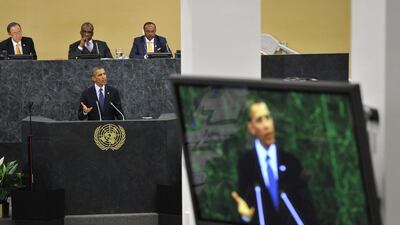new york // Barack Obama told the United Nations yesterday that he will seek a diplomatic resolution to tensions with Iran over its nuclear programme.
In a speech to the General Assembly that focused almost exclusively on the Middle East, the US president signalled a potential end to three decades without direct talks between the US and Iran, but cautioned against expecting an immediate shift in the relationship.
“I don’t believe this difficult history can be overcome overnight,” Mr Obama said.
“But I do believe that if we can resolve the issue of Iran’s nuclear programme, that can serve as a major step down a long road towards a different relationship – one based on mutual interests and mutual respect.”
Mr Obama said he was directing the secretary of state John Kerry to work with the European Union, United Kingdom, France, Germany, Russia and China to engage in talks with the government of the Iranian president Hassan Rouhani, who addressed the General Assembly later in the day.
“I firmly believe the diplomatic path must be tested,” Mr Obama said, as Iran’s new foreign minister, Javad Zarif, looked on.
Mr Zarif and Mr Kerry are scheduled to come face to face tomorrow at a meeting between the foreign ministers of Iran and the five permanent Security Council members, as well as Germany.
Mr Obama also urged increased pressure on the Syrian leader Bashar Al Assad to stick to his promise to relinquish his chemical weapons.
“There must be a strong Security Council resolution to verify that the Assad regime is keeping its commitments,” Mr Obama said. “There must be consequences if they fail to do so.”
“Without a credible military threat, the Security Council has demonstrated no inclination to act at all. If we cannot agree even on this, then it will show that the United Nations is incapable of enforcing the most basic of international laws,” Mr Obama said.
Mr Kerry and the Russian foreign minister, Sergei Lavrov, were to meet yesterday to work on differences over the Security Council resolution that would provide the framework for disarming Syria of its chemical arsenal. Russia has said it will not accept any resolution under Chapter VII of the UN charter, which would allow enforcement measures such as military intervention or sanctions.
Mr Obama also announced that the US would provide US$339 million (Dh1.24 billion) in additional humanitarian aid for Syrians affected by the two-and-a-half year civil war that has displaced almost seven million people and killed more than 110,000. US humanitarian assistance in Syria now stands at over $1.3 billion since the war began.
He urged world powers who back opposite sides in the Syrian conflict to push for peace negotiations in Geneva. He maintained his administration’s position that Mr Al Assad must step down from power in any transition that takes place. But, he said, the Syrian opposition must accept that Syria’s state institutions would remain intact.
The Middle East focus in Mr Obama’s first speech to the UN in his second term as president was in contrast to the concerted effort during his first term to emphasise his administration’s desire for a strategic shift in US interests away from the region to East Asia.
The president also stressed the importance of recently renewed Palestinian-Israeli negotiations on a peace agreement. The long hiatus in direct talks was ended through the efforts of Mr Kerry, in the face of deep scepticism among White House advisers.
“The time is now ripe for the entire international community to get behind the pursuit of peace,” he said. “Already, Israeli and Palestinian leaders have demonstrated a willingness to take significant political risks.”
Mr Obama framed the resolution of the Iranian nuclear issue and a two-state solution between Israel and Palestine as crucial to stabilising the entire region.
The president repeated his warning to Egypt’s government that it could lose US military aid if it did not put the country back on the path to democracy. He stopped short of saying that a full suspension was imminent.
The US president acknowledged the limits of America’s ability to shape events unilaterally in the Middle East, and referred to the “hard earned humility” from the lessons of the US occupation of Iraq.
Disengagement from the world would be a mistake for the US, Mr Obama said, but would negatively affect the world more. He prodded the international community to work with the US to address the world’s political challenges and humanitarian tragedies.
While again declaring the US an “exceptional” country that has a unique role in the world, an implicit rebuke to the Russian president Vladimir Putin, Mr Obama said it could not be expected to carry the burden it had in previous decades.
But Mr Obama addressed the questioning of American commitment in the Middle East among regional allies after he reversed course on military strikes against Syria, by saying his administration would still act to protect core US interests, which include security for the flow of oil, counterterrorism and the stopping the proliferation of weapons of mass destruction.
“The United States of America is prepared to use all elements of our power, including military force, to secure these core interests in the region,” he said. “We will confront external aggression against our allies and partners, as we did in the Gulf War.”
But, he said, “we can rarely achieve these through unilateral American action”.
tkhan@thenational.ae

